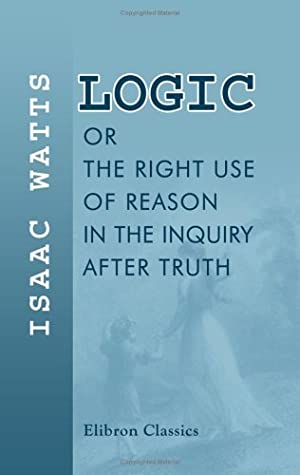

 |

|

The average rating for Logic, or, The Right Use of Reason in the Inquiry after Truth: With a Variety of Rules to Gu... based on 2 reviews is 4.5 stars.
Review # 1 was written on 2018-04-19 00:00:00 Antonio Ploszay Antonio PloszayIsaac Watts organizes his Logic text according to what he calls the four functions of the human mind: Perception, Judgment, Reasoning, and Disposition. Most logic books jump quickly to reasoning. I was surprised at how much time Watts spent on the nature of ideas, the categories of ideas, the way we use words as symbols to create categories, the way we should define various kinds of things and ideas, etc. It impressed on me something that I think often distinguishes a good logic student from a poor logic student, but that I had never been able to see before. Over half the book is taken up with categorizing ideas, defining terms and words, and using those terms to make statements. It’s not until about 70% of the way into the book that he even begins to talk about arguments, syllogisms, or reasoning. His section on statements and how we determine the truth value of statements was especially good. He talks about how truth value is determined for different kinds of statements. His discussion of prejudice and the sources and kinds of prejudice is fantastic. He has a good, and very thorough discussion of syllogisms focused on how arguments in their many different forms actually work in English. Finally his book is full of practical advice for reasoning, learning, and communicating. While many of the scientific examples he uses in the book are outdated, and one example he uses contains some, ahem, outdated notions of race, the book still stands as a great primer in logic and a fantastic source of practical advice on reading, learning, thinking, and remembering, as well as putting what you have learned to good use in your life. |
Review # 2 was written on 2013-01-07 00:00:00 James Maupin James MaupinIt is hard to believe that this was the standard textbook used in primary schools. Have we really become that "dumbed" down that this book seems more appropriate for a university level course? I am sure that as secularism took over the school system this book and course were forced out. If logic, like in the book, were still taught in the school system the average atheists would not even have a platform. His fallacy laden arguments would be easily exposed and corrected by school age children. The book explains concepts and gives definitions to help the reader better understand logic. I love the simple examples, and often biblical ones, that the author uses to illustrate his points. Some of the language may be a little outdated as words change meaning over time. There were parts that were a little dry, but overall a good read. The book closes with practical advice for those engaging in debate. My favourite quote from the book, and argument used against the skeptic/agnostic is: "Whatsoever is dictated to us by God Himself, or by men who are divinely inspired, must be believed with full assurance. Reason demands us to believe whatsoever divine revelation dictates; for God is perfectly wise, and cannot be deceived; He is faithful and good, and will not deceive His creatures; and when reason has found out the certain marks or credentials of divine testimony to belong to any proposition, there remains no farther inquiry to be made, but only to find out the true sense and meaning of that which God has revealed, for reason itself demands the belief of it." |
CAN'T FIND WHAT YOU'RE LOOKING FOR? CLICK HERE!!!